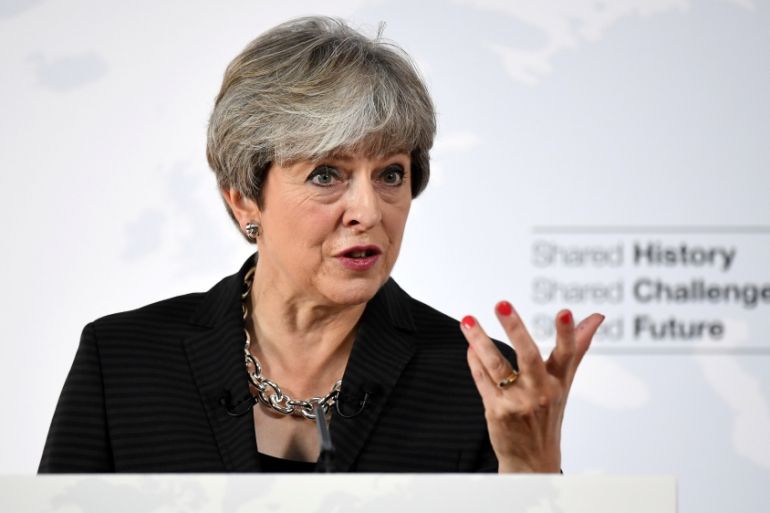Theresa May proposes two-year transition after Brexit
Cautious praise by EU to UK leader’s speech, while European leaders urge more clarity on citizens’ issue and budget.

British Prime Minister Theresa May has proposed a transition period of “around two years” after her country’s exit from the European Union, or Brexit, in March 2019.
In a wide-ranging address on Friday in Italy’s Florence, the UK leader set out a plan to retain full access to the EU’s single market until 2021 in a bid to reassure businesses and reset the stalled negotiations with the bloc.
Keep reading
list of 4 itemsNorthern Ireland agreement could end deadlock, restore government
Forced to become British: How Brexit created a new European diaspora
Number of Britons regretting Brexit hits new record high: Survey
“People and businesses, both in the UK and in the EU, would benefit from a period to adjust to the new arrangements in a smooth and orderly way,” she said.
OPINION: Brexit Britain – A United Kingdom of hate and denial
May added: “During the implementation period, access to each other’s markets should continue on current terms and Britain should also continue to take part in existing security measures.”
|
|
The prime minister also signalled a willingness to pay a bill for leaving the EU, saying Britain “will honour commitments we have made during the period of our membership”.
On June 23, 2016, Britain voted in favour of Brexit, with the Leave campaign receiving 52 percent in a referendum.
She reassured other EU members that they need not worry “that they will need to pay more or receive less over the remainder of the current budget plan as a result of our decision to leave.”
The current EU budget runs until 2020.
May also called for a new security treaty between Britain and the EU, saying close cooperation is key to fighting crime, as well as tackling security and military threats.
May pledged to protect EU citizens’ rights in Britain after Brexit, saying that decisions by the European Court of Justice (ECJ) would be taken into account by UK courts.
But on trade, May warned that remaining a member of the European Economic Area would not suit Britain and neither would a Canadian-style trade deal. Instead, she called for a “bold, new strategic agreement”.
Jeremy Corbyn, leader of the opposition Labour Party, welcomed the transition period, but said that “15 months after the EU referendum, the government is still no clearer about what our long-term relationship with the EU will look like.”
Europe reacts
May’s comments won a cautious welcome from the EU on Friday.
In a lengthy statement, the bloc’s chief Brexit negotiator, Michel Barnier, praised the speech for showing “constructive spirit” and “willingness to move forward” but “must be translated into a precise negotiating position” to make real progress.
John Springford, director of research at the Centre for European Reform, said May’s speech was “constructive in tone” but “vague in terms of real specifics”.
“We are now a year into a negotiation here, but there is still a lot of nitty-gritty that needs to be sorted out,” he told Al Jazeera.
Al Jazeera’s Neave Barker, reporting from Florence, said that May went to Italy to build bridges between the UK and EU.
“Despite Brexit, she believes the UK shares a common historical cultural identity with the rest of Europe, he said. “But the view from Brussels is that May is demanding the best of both worlds.”
“The real pressure now is on the British government to really tighten up its plans going forward before the next round of negotiations on Monday.”
READ MORE: Is Brexit really going to help British workers?
|
|
Arlene Foster, the head of Northern Ireland’s Democratic Unionist party (DUP), which is propping up May’s government, called for any Brexit transition period to be kept to a minimum and accused the EU of trying to damage Britain.
The DUP campaigned to leave the EU during last year’s referendum, but 56 percent of Northern Ireland voters supported remain.
French President Emmanuel Macron said that rules on the settlement of EU citizens, the financial terms of Britain’s departure from the bloc and the question of Ireland must be clarified in Brexit talks before other issues can be tackled.
“If these three points are not clarified, we will not be able to advance on the rest,” Macron said in a joint briefing after a visit by Finnish Prime Minister Juha Sipila to the French capital of Paris.
|
|